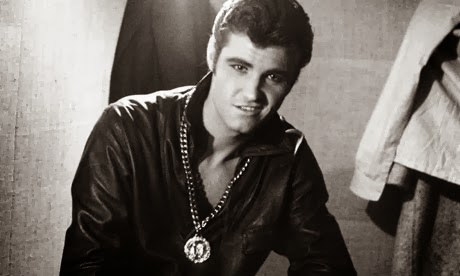 |
| Leon Payne |
Over the years, the story of the song's origin has become as twisted as its subject matter, with many falsehoods spreading across the Internet. The most common story is that the song was a reaction to the mass-shooting rampage perpetrated by Charles Whitman on the University of Texas campus in August 1966. Other sources say the song was inspired by the classic 1960 Alfred Hitchcock film "Psycho" and/or Robert Aldrich's intense 1964 Southern gothic film, "Hush Hush, Sweet Charlotte", which is possibly the creepiest soap opera ever made. I'm sure you're all familiar with the Hitchcock story, so enjoy the rarely seen "Charlotte" trailer... if you dare!
"The movie story came from my mother, and she was known to exaggerate at times," says Myrtie Le Payne, Leon Payne's daughter. Since both Payne and his wife were blind, their daughter did accompany them to movies and whisper descriptions of what was happening onscreen, but cinematic horrors were not the direct source for "Psycho."
After years of people asking her about the song, Myrtie Le only recently tracked down the true story. "Jackie White was my daddy's steel guitar player," she says. "He started working with him in 1968, and the song came out of a conversation they had one day."
According to the story related by White, in the spring of 1968, he and Leon Payne were discussing the murders of eight student nurses in Chicago in July of 1966, for which one Richard Speck was convicted and sentenced to death the following year. Being a history and true crime buff, Payne was familiar with the cases of many notorious mass killers, and the discussion soon turned to other famous murder cases. That conversation directly inspired the song, and Payne immortalized White's contribution by naming the boyfriend killed in the first verse after him, along with working in references to some of the murderers they had discussed in lines like, "Can Mary fry some fish, Mama?"
According to the story related by White, in the spring of 1968, he and Leon Payne were discussing the murders of eight student nurses in Chicago in July of 1966, for which one Richard Speck was convicted and sentenced to death the following year. Being a history and true crime buff, Payne was familiar with the cases of many notorious mass killers, and the discussion soon turned to other famous murder cases. That conversation directly inspired the song, and Payne immortalized White's contribution by naming the boyfriend killed in the first verse after him, along with working in references to some of the murderers they had discussed in lines like, "Can Mary fry some fish, Mama?"
Another popular rumor is the that Payne stipulated the song could not be recorded until after his death. "I don't know of any songwriter who writes a song and then says 'Don't record this'." Myrtie Le says. "When Daddy wrote a song he had someone in mind to record it. He would call them and actually sing the song over the phone to them. He was quite the song pitcher."
 |
| The original 1968 single. |
"Psycho" was revived in 1974 by Michigan country singer Jack Kittel, whose considerably tidied up arrangement was used in the 1996 Bill Murray film "Larger Than Life". That version was then adapted further by Elvis Costello, who recorded a live version in 1979, and also a studio version in 1981 for the "Almost Blue" sessions, which was rightfully shelved. Here's that live recording from Mr. MacManus.
 |
| Elvis Costello's 1981 country experiment, "Almost Blue" |
Although the song "Psycho" initially sank into obscurity, various versions can be found on YouTube, including live performances by horror-fantasy writer Neil Gaiman and his wife, musician Amanda Palmer. In 1984, Australian pub rockers Beasts Of Bourbon cut their version, followed by Teddy Thompson, who recorded the song anew for the soundtrack of Gus Van Sant's heinous 1998 remake of the movie "Psycho", which is best ignored and forgotten. (You can't get those 2 hours back, you know.) It's also become a favorite cover song for many Alt-Country and Rockabilly bands that skew toward the twisted and dark side of country, thus proving a great country song will always find its audience, once the world gets weird enough.
Finding Elvis Costello's version of "Psycho", which was issued as a bonus track on his album "Almost Blue", is certainly easy enough. Amazon can assist with that. The recordings of Eddie Noack, long out of print stateside, have been picked up by the German archival label, Bear Family, whose uber-quality reissues of classic American Rock 'n Roll are without peer. There's an Eddie Noack anthology, "Psycho: The K-Ark and Allstar Recordings 1962-1969" on CD at Amazon, or if you just want that one song, there's a 7" vinyl single in a picture sleeve. It's a Limited Edition of 500 numbered copies, and goes for about $10. I'd be surprised if it's not pressed in red vinyl. It should be, if it isn't.
Regarding the version by Jack Kittel; an album of his is available, but because it's Halloween, I'm gonna steer you toward this wild compilation from Ace Records in the UK, "Dead! The Grim Reaper's Greatest Hits"! It features Kittel's version and all of your favorite teen tragedy songs, including many rarities not found elsewhere on CD, including the death song to end all, "I Want My Baby Back" by Jimmy Cross. It's morbid, but fun, and Ace makes quality products of the same caliber as Bear Family.






















